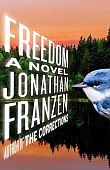The Human Condition at its Most Raw: Jonathan Franzen’s Freedom
 Believed by many to be the “The Next Great American Novel” Jonathan Franzen’s 2010 work of fiction Freedom caused a tsunami among readers and literary critics. At 562 pages, Freedom is a difficult book to digest and not merely because of its length. The human condition is written in such vivid detail, with such excruciating imagery and language, that one might find it too raw, too explicit, too distressing—In essence, too realistic.
Believed by many to be the “The Next Great American Novel” Jonathan Franzen’s 2010 work of fiction Freedom caused a tsunami among readers and literary critics. At 562 pages, Freedom is a difficult book to digest and not merely because of its length. The human condition is written in such vivid detail, with such excruciating imagery and language, that one might find it too raw, too explicit, too distressing—In essence, too realistic.
Franzen created what he believes to be Any American Family, USA. He carries readers on a winding, tumultuous journey through the inner workings of daily life. Sparing us no detail, Franzen takes us inside the bedroom, the bathroom, onto the floor, up into the clouds, outdoors into the most raging weather. However, none of this compares to the emotional trauma we experience vis a vis Franzen’s characters. As readers of Freedom, or, more aptly, “riders” of Freedom, we will writhe our way through death, depression, infidelity, elation, psychoses of every kind, marriage tribulations, child/ parent relationships, heartbreak, teenage angst, aging, destruction of the planet, mind over matter, time and space—all in gut-wrenching real time.
Freedom could have just as easily been titled “Bondage.” At times, the novel will become so alive to the reader that he may feel as if he has been plucked from his chair, superimposed into the story and trapped. Unable to put the book down (whether one likes the plot or not), readers will become imprisoned inside the world Franzen constructed. Consequently, we will feel all of the hurt, pain, ecstasy, uncertainty, longing and loathing, right alongside each character as he/ she experiences it.
Franzen has managed to strip his characters down to their absolute cores. They are presented to us stark naked, as vulnerable individuals who show all dimensions of their personalities—all of their flaws, successes, intentions, hesitations, quandaries, neuroses and suspicions. We have access to their conscience and their sub-conscience. Whether one fancies the ride or not, it is unlikely a reader will be able to abort the journey without reaching its epic conclusion.
Franzen took the family unit and turned it inside out, rendering it transparent. He discusses subject matter that even the most progressive of readers will find jarring. Once completed, rather than freeing the reader of its stronghold, Freedom will continue to plague. Long after its cover has been closed, Freedom will resurface, pricking and probing, affecting the choices we make and our day-to-day thought processes. Freedom’s impact is such that it leaves a lasting imprint on the soul. And such was Franzen’s intention! The Freedom residue is stubborn. It will not easily be sloughed off or minimized. Reading “lighter” works following Freedom will not reverse its blow.
To some, Freedom has been hailed a masterpiece; its impression embraced as extraordinary and revolutionary. To others, Freedom is an unwanted tattoo, imbedded permanently in our brains; an unwelcome reminder of a harsh world. Either way, the first edition (and possibly subsequent editions) of this work will, without question, be worth something, both in monetary value and in impressionability.

{ 1 comment… read it below or add one }
This book has been in my house for months and I have had no desire to read it as my partner and I don’t usually like the same books. Your review has made me curious so I will now read it. I will try to get back with you with my reaction. Thanks for the review…